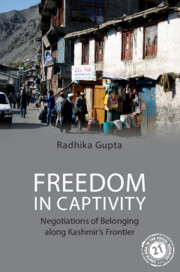Book contents
- Frontmatter
- Contents
- List of Figures
- Acknowledgements
- List of Abbreviations
- Notes on Transliteration
- Introduction: Freedom in Captivity
- 1 Genealogies of Political Consciousness
- 2 Reforming Self and Society
- 3 Fighting for Justice
- 4 Talking about Culture
- 5 Living on the Edge
- Epilogue
- Glossary
- Bibliography
- Index
Introduction: Freedom in Captivity
Published online by Cambridge University Press: 10 January 2023
- Frontmatter
- Contents
- List of Figures
- Acknowledgements
- List of Abbreviations
- Notes on Transliteration
- Introduction: Freedom in Captivity
- 1 Genealogies of Political Consciousness
- 2 Reforming Self and Society
- 3 Fighting for Justice
- 4 Talking about Culture
- 5 Living on the Edge
- Epilogue
- Glossary
- Bibliography
- Index
Summary
The traversals of freedom and subordination, sovereignty and subjection, and autonomy and compulsion are significant markers of the dilemma or double bind of freedom.
—Saidiya V. HartmanEvery year in the month of July, the otherwise sleepy town of Drass, a key site of confrontation in the fourth war between India and Pakistan, buzzes with activity. By this time of summer, the streams are gushing with snowmelt, and the mountainsides and pastures are a verdant green. Construction work has resumed for the season, and residents are busy tending to their fields of barley or travelling to Srinagar for errands that winter brought to a halt. Besides the greater traffic of tourists stopping for a cup of tea in the Drass bazaar on their way to Srinagar or Leh, the Indian army and district administration of Kargil are also gearing up to organise the annual Vijay Diwas celebrations to mark India’s victory over Pakistan in the Kargil War (1999). This was the first war to be mediatised, beamed through national television directly into people’s homes in India. Fought on the high mountain battlegrounds of Kargil – located along the de facto border in the far northwest frontier of Indian-controlled Kashmir – the Kargil War continues to have a long affective afterlife in the national imagination. Images of soldiers holding aloft the Indian flag on Tololing and Tiger Hill, the two peaks on this treacherous terrain which the Indian army recaptured from Pakistani incursions in 1999, are today household names. The war captivated the nation, and like legends told and retold, its enchantment has been sustained through Vijay Diwas celebrations.
The tenth anniversary of the war demanded even greater pomp and splendour. Heavy security arrangements were in place for the high-profile nature of the event in 2009, for the guest list included army generals, the kin of martyred soldiers, Bollywood stars and the national media. Against a backdrop of rugged mountains with patches of melting snow, a hill slope etched with ‘Tenth Anniversary, Op. [Operation] Vijay Divas’ ran down to a vast ground prepared for the event with the neatness and precision of a cantonment area. Marquee-like tents had been erected for the dignitaries to watch a horse-polo match, a traditional sport in the region, and a cultural show.
- Type
- Chapter
- Information
- Freedom in CaptivityNegotiations of Belonging along Kashmir's Frontier, pp. 1 - 31Publisher: Cambridge University PressPrint publication year: 2023

